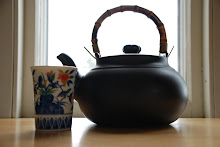
An unexpected thaw left puddles in its wake. On a late morning walk, I skirted pools of melted snow while peering into their shimmering depths. I saw the outlines of trees, their branches startlingly clear, shake a bit on a glassy surface as a light wind blew in from the lake. The ruffled limbs soon rearranged themselves into a world more seemingly perfect than its source.
At home, I brewed some lotus tea, celebrating the unseasonable warmth with a cup of tea redolent of flowers. Lotus tea may lack subtlety but it makes up for it in being so good-naturedly floral. Its base of Vietnamese green tea is generously perfumed with the essence of lotus flowers, and it has a self-styled tea purist like me embrace it as one my favorite greens.
A reflection of the maple tree which stands in our neighbor's backyard -trimly framed by the curves of my teacup- vanished as I took the first sip. Miniaturized, the reflected reality has a dreamlike quality -always seemingly taking place in the twilight of day when a placid surface barely conceals unknown possibilities.

I sip the tea and I become steeped in its warmth. My thoughts and perceptions feel suffused with mellow clarity. The cynic in you may dismiss this state as merely the overcaffeinated brain of one who has read The Doors of Perception once too many times. And perhaps there's a tinge of truth to that. Caffeine content aside, however, tea for me is a daily reminder, a welcome nudge towards mindfulness. It's when I allow myself those few minutes each morning to rest my eyes on that otherworldly reflection of a tree, the starkly outlined branches of the maple, while swirls of steam rise from my cup. I remember to sit down at the kitchen table, even if just for one sip, as I hold the cup in my hands, the heat prickling my skin. With the first sip, I am expectant: a familiar loll on the tongue, a deep inhalation that's deeply luxuriant.
I sighed, glancing at the clock, pouring the rest of my tea into the Thermos for the short ride to work.















